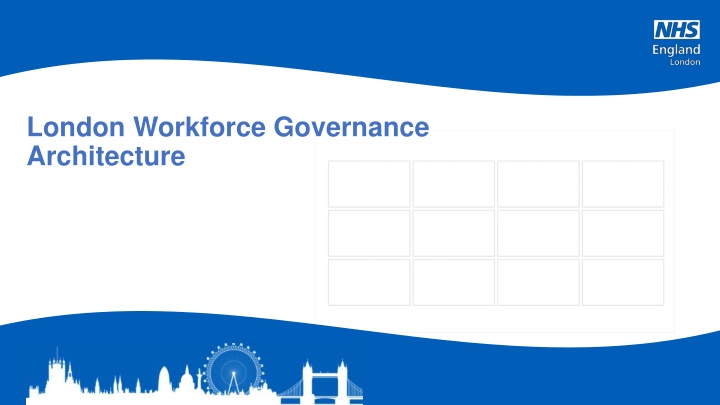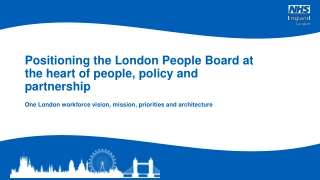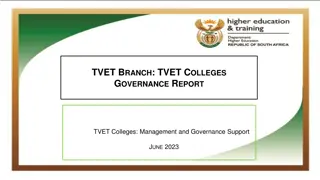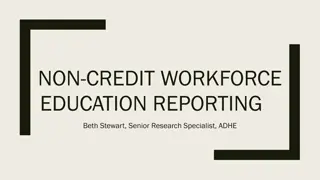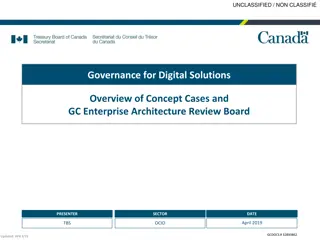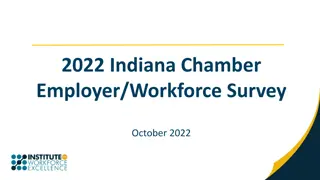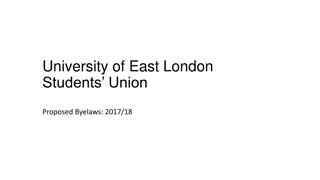London Workforce Governance Architecture
Explore the workforce governance architecture in London, addressing the structuring and management of the city's workforce. Dive into the strategies and frameworks employed for effective governance in the capital city of England.
Download Presentation

Please find below an Image/Link to download the presentation.
The content on the website is provided AS IS for your information and personal use only. It may not be sold, licensed, or shared on other websites without obtaining consent from the author.If you encounter any issues during the download, it is possible that the publisher has removed the file from their server.
You are allowed to download the files provided on this website for personal or commercial use, subject to the condition that they are used lawfully. All files are the property of their respective owners.
The content on the website is provided AS IS for your information and personal use only. It may not be sold, licensed, or shared on other websites without obtaining consent from the author.
E N D
Presentation Transcript
London Workforce Governance Architecture 1 |
Greater London Authority
Greater London Authority Regional director in London meets the mayor every 8 weeks. London Recovery Board/ London Partnership Board GLA Public Health Unit London Health Board Health in all policies input to TFL, London Fire Brigade Mayor s Statutory Health Advisor Deputy Statutory Health Advisor Office for Health Improvement and Disparities Meets minimum 3 times a year NHS E is represented at the board, but are the ICS appropriately represented Key place for health and care partnership to come together Social care providers and local authority commissioners London Leaders Group Leaders support group Meets monthly 6 members Senior Execs help plan agendas for London Health Board Commission papers and discuss content for sign off by Leaders Group Sign off for discussions/ paperwork for London Health Board
Social Care Providers and Local Authority Commissioners
Social Care providers + local authority commissioners National Trade Bodies Local Authorities Wider skills landscape Care Providers RNHA, UKHCA, Care England Registered Professional Bodies Direct Payment Teams Safeguarding Teams Care LCAS ADASS LEP DBS DHSC Skills for Care Academies JCP/DWP/ Employment Projects WDF NCA NCF Quality Teams CQC TLAP Partnerships LGA Care Workers Charity Commissioning Teams Training Providers GLA/Mayor s Office BASW SCIE IHSCM Proud to Care Sub Regional LA Partnerships Local Care Associations
Health Service Partners- NHS Employers and NHS Confederation
Health service partners NHS Employers, NHS Confederation Board of directors Representatives from partner organisations, senior leaders and experts Responsible for overall strategic direction, decision making and accountability Partnership Agreements Committees A formal partnership agreement outlines the roles, responsibilities, and expectations of each partner organisation. This agreement may cover areas such as governance, financial arrangements, performance management, and risk sharing. include representatives from partner organisations, clinical experts, and other stakeholders Support BOD in specific areas such as finance, quality and Safety
Office for Health Improvement and Disparities
Office for Health Improvement and Disparities Director OHID Advisory Board Group of experts from various fields such as public health, medicine, social sciences, and community advocacy, provides guidance and advice to the Director on matters related to health disparities, policy formulation, program implementation, and evaluation. The Advisory Board meets regularly to review OHID's progress, provide recommendations, and ensure that the agency's initiatives align with its mission and goals. Chief Executive Officer Specialised offices that focus on specific aspects of health improvement disparities. Including. policy development, research and evaluation, community engagement, program implementation, and communications. These offices or divisions are headed by directors or managers who report directly to the OHID Director and are responsible for overseeing the day-to-day operations and implementation of OHID's initiatives. Responsibility for the overall management and strategic direction of the agency. The Director is appointed by the President or other relevant government officials
The UK Health Security Agency
UK Health Security Agency Specialised divisions or directorates Executive Chair Senior leadership team UKHSA Board Appointed by the Secretary of State for Health and Social Care Consisting of directors or heads of various functions, such as operations, strategy, communications, and finance. Responsible for key functions, such as surveillance and response to infectious diseases, emergency preparedness and response, health protection policy, and health intelligence. Independent Board Responsible for the overall management and strategic direction of UKHSA Group of experts from fields such as public health, infectious diseases, emergency preparedness, and healthcare delivery, who provide strategic advice and challenge to the Executive Chair and the senior leadership team. Headed by directors or heads who report directly to the Executive Chair and are responsible for the day-to-day operations and implementation of UKHSA's initiatives in their respective areas of expertise.
Department of Health and Social Care
Department of Health and Social Care Director General Senior Leadership Team Executive committee comprising representatives from relevant stakeholders, including healthcare providers, local authorities, and service users, to provide oversight and guidance on decision-making. Provide strategic direction and oversee the overall operations of the department.
Royal colleges and Professional Bodies
Royal colleges and professional bodies Committees and Working Groups General Assembly or Council The Academy Council Royal Colleges in London may have various committees and working groups that focus on specific areas of interest or expertise, such as education and training, examinations, research, ethics, and quality improvement. These committees and working groups are responsible for developing policies, guidelines, and standards in their respective areas and may be composed of members from the college and external experts. Comprises the Presidents of the member Colleges and Faculties (plus the Chair of the Royal College of General Practitioners Council) and four coopted council members. Some Royal Colleges may have a General Assembly or Council that serves as the main governing body of the college. This may include elected representatives from the membership who participate in decision- making, policy development, and oversight of the college's activities. Backto home
Social partnership and Trades Unions
Social partnership and Trade Unions Shaping the relationship between employers and employees, advocating for workers' rights, and addressing labor-related issues. Social partnerships and trade unions in the medical workforce are structured in a way that allows for collective bargaining, representation, and negotiation on behalf of medical professionals. Representatives from trade unions, professional bodies, and employers, who establish policies, procedures, and frameworks for addressing issues such as working conditions, remuneration, workload, and career progression. These social partnerships and trade unions work collaboratively to ensure that the interests of the medical workforce are protected and that fair and equitable conditions are maintained. Professional Bodies Trade unions Organisations that represent the interests of workers. They negotiate with employers on behalf of their members to secure favorable working conditions, wages, and benefits. Trade unions also provide support and representation for individual members who face grievances or conflicts in the workplace. Set standards for professional practice, provide guidance on ethical issues, and advocate for the interests of their members. Professional bodies work closely with trade unions and employers to ensure that the medical workforce has appropriate representation and influence in decision-making processes. Organisations that represent the interests of medical professionals
Workforce, education and training research
Workforce, education and training research Applied Research Collaboratives (ARCs): North Thames, North West London, South London Academic Health Science Networks (AHSNs): National Institute for Health and Care Research (NIHR): Health Service Research UK (HSR UK): membership organisation dedicated to the promotion of health services research in policy and practice Research body focused on early translational research, clinical research and applied health and social care research UCL Partners Imperial College Support applied health and care research that responds to, and meets, the needs of local populations and local health and care systems. Health Improvement Network Focused on demonstrating how evidence-based innovations can drive efficiencies and improvements in methods of working, including digital workforce skills.
Anchor partners Health and Social Care: NHS Confederation, NHS Employers, NHS Providers Further Education: Association of Colleges Local Government: LGA, GLA, London Councils Voluntary, Community and social enterprise 5 Integrated Care Board Higher Education: Universities UK, University Alliance, Council of Deans, London Higher Industry: CBI, UK Chambers of Commerce, Business LDN, London Chamber of Commerce and Industry Schools: Confederation of Schools Trusts National Council for Voluntary Organisations NHS National Health Anchor learning network Think Tanks: Health Foundation, King s Fund, Nuffield Trust, Centre for London Social Enterprise UK System anchor teams Emergency Services: Met Police, London Fire Brigade London Plus Provider anchor teams
Relevant Government Departments
Relevant Government Departments Department for Levelling Up, Housing and Communities Department for Work and Pensions Department for Health and Social Care HM Treasury Responsible for setting overall strategy, funding and overseeing the health and social care system with, and through, its 28 agencies and public bodies The government s economic and finance ministry, maintaining control over public spending, setting the direction of the UK s economic policy and working to achieve strong and sustainable economic growth Responsible for range of policy areas aimed at supports communities across the UK to thrive, making them great places to live and work; including overseeing local government, planning and building safety, policy on devolution and funding for local areas to drive growth and create jobs. Responsible for welfare, pensions and child maintenance policy Department for Education Minister for London Responsible for children services and education, including early years, schools, higher and further education policy, apprenticeships and wider skills in England A ministerial post in DLUHC with responsibility for policy relating to London, including informing MPs in the House of Commons on the activities of the GLA.
Relevant Public Agencies
Relevant Public Agencies Charity Commission; National Citizen Service Department for Work and Pensions Department for Education Cabinet Office Home Office The Office for Standards in Education Migration Advisory Committee The Pensions Regulator Social Mobility Commission; Equality and Human Rights Commission; Senior Salaries Review Body The Office of Qualifications and Examinations Regulation Office for Students Money and Pensions Service Department for Culture, Media and Sport oversees the following agencies/public bodies of relevance: Education and Skills Funding Agency; Social Work England Student Loans Companies Institute for Apprenticeships and Technical Education
Social Care Providers and Local Authority Commissioners Health Service Partners- NHS Employers and NHS Confederation Office for Health Improvement and Disparities Greater London Authority Department of Health and Social Care The UK Health Security Agency Royal colleges and professional bodies Social partnership and Trades Unions Workforce, education and training research Relevant Government Departments Relevant Public Agencies Anchor Partners 27 |
Appendix TFL Transport for London LEP Local Enterprise Partnerships JCP Job Centre Pus RNHA Registered Nursing Home Association DWP Department for Work and Pensions UKHCA UK Home Care Association DBS Disclosure and Barring Service NCA National Crime Agency CQC Care Quality Commission BASW British Association of Social Workers SCIE Social Care Institute for Excellence TLAP Think Local Act Personal LCAS The London Care and Support Forum IHSCM Institute of Health and Social Care Management ADASS Association of Directors of Adult Social Services UCL University College London CBI Confederation of British Industry LGA London Government Association
